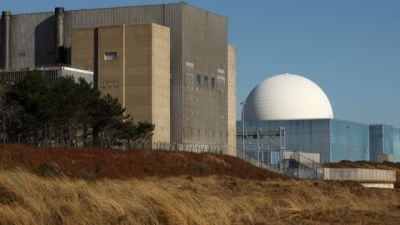Government denies Sizewell C nuclear plant in Suffolk could be scrapped amid spending cuts

The government has denied plans for the Sizewell C nuclear power plant in Suffolk are at risk of being scrapped as the chancellor looks for multi-billion pound savings.
The new reactor, located 30 miles north-east of Ipswich, was expected to be built by energy firm EDF, with Boris Johnson promising £700m of taxpayers' money to the project in his final policy speech in September as he sought to make energy security part of his legacy as prime minister.
Doubts over its future emerged on Friday, with the BBC reporting that a government official had said "every major project - including Sizewell C" was under review.
However, in later briefings a spokesman said the nuclear plant would not be part of the Autumn spending review and that the government wanted "to get a deal over the line asap".
No 10 confirmed on Friday there had been no change in its position, stressing: “It’s not accurate to say we are scrapping it.”
“It remains crucial to reducing our reliance on fossil fuels, increasing our energy security and meeting our net-zero ambitions,” the PM’s spokesman said.
“We hope to get a deal over the line as soon as possible, there are negotiations (with EDF) ongoing. Negotiations have been constructive.”
The total cost of the Sizewell C project could be around £20bn, according to reports.
It is not expected to begin generating electricity until the 2030s; the similar reactor at Hinkley Point C in Somerset began construction in 2016 and will not be online until 2027, although this is partly due to the impact of the pandemic.
Supporters of the site say it can help get the UK to run on zero-carbon power but others say the cash would be better spent on wind farms or insulation.
The government is seeking opportunities to reduce spending after the Institute for Fiscal Studies warned last month that the state faces a roughly £60bn financial shortfall following the mini-budget announcement in September.
The Treasury has since pulled back on a number of previous unfunded tax cuts or spending plans.
The chancellor last month announced that the two-year energy price freeze for all households will now run for just six months.
Jeremy Hunt said at the time that the universal energy price guarantee will finish in April, with the government launching a review on how to then support bills after this period.
Alison Downes from the campaign group Stop Sizewell C said: "The chancellor has said that eye-wateringly difficult decisions are needed so it's right that eye-watering expensive projects go under the microscope.
"Sizewell C can only offer short-term pain - with more money on our energy bills - for long term pain, with huge uncertainty about cost and time, to deliver electricity that is far more expensive than renewables. "There is no way Sizewell C offers the hard stretched public purse value for money. "Rishi Sunak and Jeremy Hunt should invest in a major energy efficiency drive that would create many thousands of green jobs, and within a very few years deliver real savings on household bills instead of increasing them through the nuclear stealth tax."
Want a quick and expert briefing on the biggest news stories? Listen to our latest podcasts to find out What You Need To Know